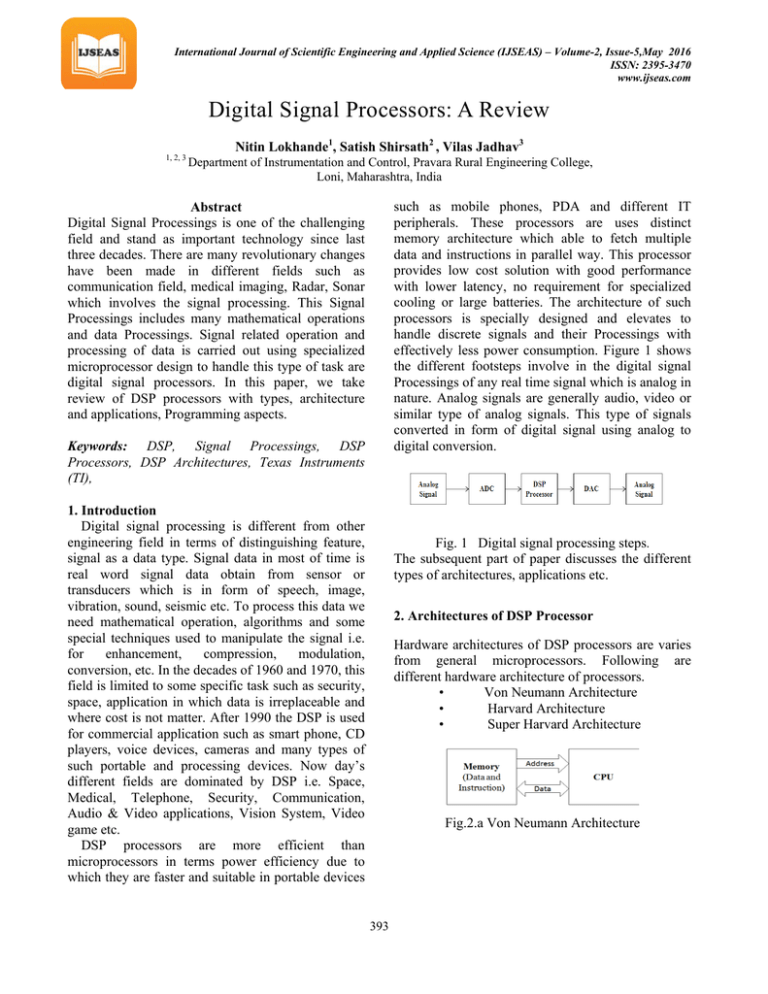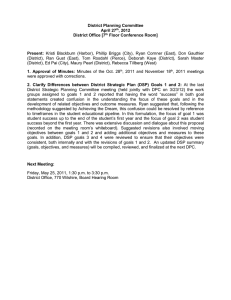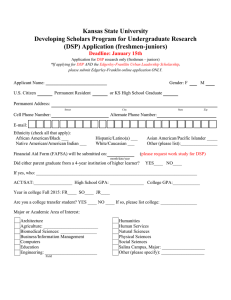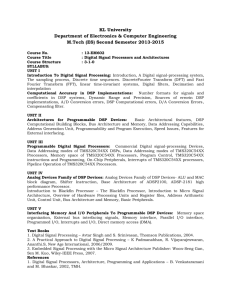Digital Signal Processors: A Review
advertisement

International Journal of Scientific Engineering and Applied Science (IJSEAS) – Volume-2, Issue-5,May 2016 ISSN: 2395-3470 www.ijseas.com Digital Signal Processors: A Review Nitin Lokhande1, Satish Shirsath2 , Vilas Jadhav3 1, 2, 3 Department of Instrumentation and Control, Pravara Rural Engineering College, Loni, Maharashtra, India such as mobile phones, PDA and different IT peripherals. These processors are uses distinct memory architecture which able to fetch multiple data and instructions in parallel way. This processor provides low cost solution with good performance with lower latency, no requirement for specialized cooling or large batteries. The architecture of such processors is specially designed and elevates to handle discrete signals and their Processings with effectively less power consumption. Figure 1 shows the different footsteps involve in the digital signal Processings of any real time signal which is analog in nature. Analog signals are generally audio, video or similar type of analog signals. This type of signals converted in form of digital signal using analog to digital conversion. Abstract Digital Signal Processings is one of the challenging field and stand as important technology since last three decades. There are many revolutionary changes have been made in different fields such as communication field, medical imaging, Radar, Sonar which involves the signal processing. This Signal Processings includes many mathematical operations and data Processings. Signal related operation and processing of data is carried out using specialized microprocessor design to handle this type of task are digital signal processors. In this paper, we take review of DSP processors with types, architecture and applications, Programming aspects. Keywords: DSP, Signal Processings, DSP Processors, DSP Architectures, Texas Instruments (TI), 1. Introduction Digital signal processing is different from other engineering field in terms of distinguishing feature, signal as a data type. Signal data in most of time is real word signal data obtain from sensor or transducers which is in form of speech, image, vibration, sound, seismic etc. To process this data we need mathematical operation, algorithms and some special techniques used to manipulate the signal i.e. for enhancement, compression, modulation, conversion, etc. In the decades of 1960 and 1970, this field is limited to some specific task such as security, space, application in which data is irreplaceable and where cost is not matter. After 1990 the DSP is used for commercial application such as smart phone, CD players, voice devices, cameras and many types of such portable and processing devices. Now day’s different fields are dominated by DSP i.e. Space, Medical, Telephone, Security, Communication, Audio & Video applications, Vision System, Video game etc. DSP processors are more efficient than microprocessors in terms power efficiency due to which they are faster and suitable in portable devices Fig. 1 Digital signal processing steps. The subsequent part of paper discusses the different types of architectures, applications etc. 2. Architectures of DSP Processor Hardware architectures of DSP processors are varies from general microprocessors. Following are different hardware architecture of processors. • Von Neumann Architecture • Harvard Architecture • Super Harvard Architecture Fig.2.a Von Neumann Architecture 393 International Journal of Scientific Engineering and Applied Science (IJSEAS) – Volume-2, Issue-5,May 2016 ISSN: 2395-3470 www.ijseas.com • Unsigned Integer: it takes number from 065535. • Signed Integer: it takes number from -32768 Unsigned to 32768. • Unsigned fraction: the 65,536 levels are spread uniformly between 0 and 1. • Signed fraction negative numbers, equally spaced between -1 and 1. In fact fixed-point means that the position of the fractional point is assumed to be fixed and to be the same for the operands and the result of an operation. Number of versatile embedded applications use fixed point processors because the priority is on low cost and low power. ADI DSP BF53X, TI’s TM320C54x, TM320C55x, TM320C62x, TM320C64x, Motorola MSC810x are types of fixed point processor. Fig.2.b Harvard Architecture Fig.2.c Super Harvard Architecture (SHARC) Programme and data memory for processing hence programme instructions and data can be fetched simultaneously leads to fast processing. Today’s most of DSP processor of this designed type. Fig.2.c shows next level of architecture designed and is called as SHARC which is abbreviation of Super Harvard Architecture. It has some more features which improve the output such as instruction cache and I/O controller for interfacing of high speed devices. It has both parallel and serial communication ports. DSPs are usually optimized for processing data and used distinct memory architectures that are able to fetch multiple data and/or instructions at the same time, such as the Harvard architecture or Modified von Neumann architecture.DSP processors are divided in two parts according to type of data format it uses. According to that they are fixed point and floating point processors. There are many issue to select the floating and fixed point processor i.e. power requirement, cost and field of application. One of the most fundamental characteristics of a programmable digital signal processor is the type of native arithmetic used in the processor. 2.2 Floating Point Processors In the floating-point notation the position if the binary point is explicitly represented in the data word. Floating point DSPs typically use a minimum of 32 bits to store each value. Distinct feature of floating point notation is that the represented numbers are not uniformly spaced. All floating point DSPs can process the fixed point numbers, a necessity to implement counters, loops, and signals coming from the ADC and going to the DAC. The SHARC DSPs are designed and optimized for both floating point and fixed point operations, and executes them with equal efficiency. Floating-point DSP processors can easily program than their fixed point processors, but usually are also more expensive and have higher power consumption. ADI ADSP 2116x/2126x, TI’s TMS320c67x are types of floating point processors. 3. Manufacturers of DSP Processor In DSP processor manufacturing LSI (Lucent, Agere), Free scale Semiconductor (Motorola), Analog Devices, ZiLOG, Renesas, Microchip and Verisilicon, NJR,NXP, ON semiconductor, are manufacturing floating as well as fixed point processors. Analog devices and TI DSP’s are mostly used for different operation and real time applications because they offer signal control, Power efficiency, high performance and Multiprocessing task. 2.1 Fixed Point Processors In fixed point DSPs, each numbers is represented with minimum 16 bits, although a different length can be used. There are different pattern are used 16 represent the number for example, 2 = 65, 535 is represented in following different bit pattern. Table 1: DSP Manufacturer and family 394 International Journal of Scientific Engineering and Applied Science (IJSEAS) – Volume-2, Issue-5,May 2016 ISSN: 2395-3470 www.ijseas.com Manufacturer Analog Devices Lucent Technologies Motorola Texas 4.2 PC code development tools Every DSP applications require the user interface on the PC. For these purpose various software interfaces are provided. These interfaces allow a designer to develop PC applications that can access and use the DSP board. • Several Dynamic Link Libraries (DLLs) are provided to develop PC applications using any development environment that supports the use of DLLs. Microsoft’s Visual Studio is an example. Using these DLLs, the PC application can load DSP code, execute it, and communicate with the board at high and low levels. • An interface library is provided to develop PC applications using the Lab VIEW development environment from National Instruments. Using this library, the PC application can load DSP code, execute it, and communicate with the DSP board. MATLAB Code Generation and embedded target products. Families ADSP-21xx 16 bit, fixed point ADSP-21xxx 32 bit, floating DSP16xxx 16 bit fixed point DSP32xx 32 bit floating DSP561xx 16 bit fixed point DSP560xx 24 bit, fixed DSP96002 32 bit, floating TMS320Cxx 16 bit fixed TMS320Cxx 32 bit floating 4. Programming of DSP DSP code can be developed using the Code Composer Studio i.e. abbreviated as CCS development environment. This development environment is provided by Texas Instruments, and contains the main following tools; Optimizing C compiler, Assembler, Linker, Simulator. These tools allow the development of DSP code in C++, C, or assembly language, and generate an executable file that can be downloaded to the DSP using the debugger. High-performance simulators, emulator and debugging facilities allow the developer to have a high visibility into the DSP without disturbing the program execution. Additionally, multiple DSPs can be accessed in the same JTAG chain for both code development and debugging. 4.3 DSP Peripheral-serial Interface Peripherals are considered amount of supported interconnect and data I/O is huge. 1. Serial Peripheral Interface: It is synchronous serial link that supports communication with multiple SPI compatible devices. It has industry standard. 2. Multichannel buffered serial port this serial interface is based upon the standard serial port found in different DSP. 3. Multichannel Audio Serial Port on TI DSP this is a serial port optimized for the needs of multichannel audio applications. 4.1 Debugging tools It consists in user interface running on computer as well as a communication kernel running on the DSP. The communication kernel is a small code that executes on the DSP and supports data exchanges between the PC and the DSP. Debugger performs following operation; • load executable code into memory • launch execution code from any point • initialize to given address • Read /Write the CPU register in real time. • Data can be represented in graphics processed by DSP. 4.4 DSP Peripheral-Parallel Interface Parallel interfaces that allow DSP–DSP as well as DSP–peripheral. This is useful to create inter DSP communication and multi DSP systems. TI DSP offers peripheral component interface, host port interface and general purpose input/output. 5. Application of DSP Processor DSP processors find use in an extremely diverse field of applications, from industrial application to general consumer electronics. Table.2 Application of DSP 395 International Journal of Scientific Engineering and Applied Science (IJSEAS) – Volume-2, Issue-5,May 2016 ISSN: 2395-3470 www.ijseas.com Field Space Commercial Communication Military Medical Industrial Sons, Inc., Print ISBN 0-471-29546-9 Online ISBN 0-471-20059-X. PP.6119-644. [6] Rulph Chassing, “Digital Signal processing and Applications with C6713 and C6416 DSK” A JOHN WILEY & SONS, INC., PUBLICATION. Task Space photograph enhancement Data compression Image and sound compression Video conferencing Biometrics ,Video surveillance systems Audio processing, Signal Multiplexing, Filtering. Noise reduction Data compression Radar Sonar Guidance systems Diagnostic Imaging ECG analysis Design Tools Testing and Analysis Simulation and Modelling Vision Systems. 5. Conclusion Selection of right DSP processor application; a good choice for one application might be a poor choice for another. In this paper we have done the survey of DSP processors in context of hardware architectures, different manufacturers in processor developments and software support to this processors and application of signal processors. References [1] Steven W. Smith, “The Scientist and Engineer's Guide to Digital Signal Processing”. [2] M.E. Angoletta., “Digital signal processor fundamentals and system design,” CERN, Geneva, Switzerland. [3] Berkeley Design Technology, Inc., “Choosing a DSP Processor,” 1996-2000 Berkeley Design Technology, Inc. [4] Bruno Paillard, “An Introduction to Digital Signal Processors” BRUNO PAILLARD ING. January 27 2002. [5] Jonathan Y. Stein Digital Signal Processing: A Computer Science Perspective, John Wiley & 396


